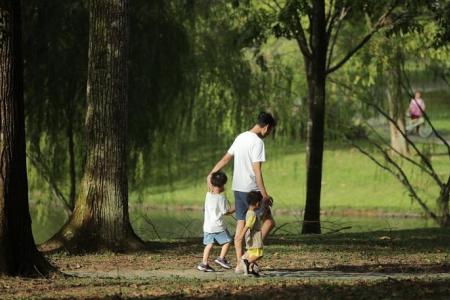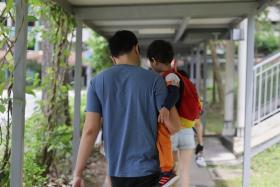1 in 2 dads in S'pore took paternity leave in 2022
When his daughter was born in December 2023, Mr Amos Tan was unable to take his two weeks of paternity leave as his manager had been diagnosed with cancer, and Mr Tan had to take over the responsibility of managing the department.
As a compromise, he took half-days of paternity leave to take his daughter to the polyclinic thrice a week when she had jaundice.
Mr Tan, a sales manager in engineering firm Mecomb, said the first three weeks of juggling work and the baby after the confinement nanny left were stressful.
“I (live) in Tampines, but my office is in Jurong West. At night, I had to take care of my kid, wake up every two hours, take her for her check-up in the morning, and at 11am, drive back to the office.”
When his wife’s maternity leave ended, she left her job as a human resource executive to care for their daughter. The plan is to put the girl in a playgroup when she turns 18 months old, after which his wife may work freelance to have more flexible hours.
Since government-paid paternity leave was introduced in 2013, take-up rates have more than doubled from about 25 per cent to more than 50 per cent of fathers in recent years, according to the latest data from the National Population and Talent Division.
In 2022, the take-up rate for paternity leave stood at 53 per cent – the same as the two years before – while maternity leave was 74 per cent.
New fathers said paternity leave let them support their wives and learn the ropes of baby care from confinement nannies. They could also take it in blocks within a year of their child’s birth.
Two more weeks of paternity leave were introduced on a voluntary basis from 2024, but some dads whose companies offer such leave are saving it for when they need it.
Mr Andrew Lam, 38, a finance manager at Mandai Wildlife Group, took two weeks of paternity leave when his daughter was born in January, but is saving the remaining two weeks for when she falls sick, and when the infant care centre closes.
He and his wife, who also works at Mandai as a sales and experience development manager, took turns working from home after his wife’s maternity leave ended. The company lets employees work from home two days a week.
Mr Lam also took about five days of annual leave to help care for his daughter, before she started attending infant care near their home in July.
Most parents want to be their babies’ primary caregivers, but not many can do so because of work commitments, going by an online infant care poll conducted in October 2022 by the Ministry of Digital Development and Information involving more than 500 parents and parents-to-be.
The survey found that 68 per cent of respondents wanted themselves or their partner to be their infant’s main caregiver, but only 32 per cent managed to do so.
For those who could not be the main caregiver, the need to work was cited as the key reason why they turned to relatives, helpers or infant care centres for help.
Fathers are unlikely to take the added two weeks, as they are not mandatory, said Mr Tan. “I think with the current workload that Singaporeans have, it’s tough to take more than three weeks at one go,” he added.
He plans to take his remaining six days of paternity leave when his wife needs a break from caregiving. “It’s good to have their own time outside with their friends, because taking care of the kid is quite mentally stressful.”
Lawyer Darius Lee also split up his two weeks of paternity leave, taking a week off when his son was born in September 2022, and another week’s worth in half-days.
“There were still some deadlines to meet... So it was practical for me to spread out the paternity leave, so that I could still move the work forward,” he said.
The 36-year-old later scaled back on his job at law firm Characterist from January 2023 to take care of his son, while his wife went back to work as an in-house lawyer in a property development company.
Even though he also became executive director of Cultivate SG, a non-profit organisation which focuses on research and education to help families thrive, he has flexi-hours and can work from home.
Mr Lee, whose wife is expecting another baby in December, takes care of his son with the help of a maid and his in-laws.
Mr Alan Phua, 41, took two weeks of paternity leave when his son was born in January, and two weeks after his wife’s month-long confinement ended.
Now, both he and his wife, co-founders of start-up Alchemy Foodtech, have returned to work, and their helper or in-laws take care of the boy.
He did not mind continuing to work from home during his paternity leave, even getting on a call with investors in the hospital the day after his wife delivered. “I believe that if you continue to give your good efforts to the business, it is possible for the business to also care about your needs,” he said.
He encourages his employees to take four weeks of paternity leave. “I think if they are not settled at home, they can never concentrate at work.”
His employees work from office one to two days a week. “What we have always experienced is that good employees are good no matter where they are, whether they’re in front of you or not,” he said.
Mr Lee said he got negative reactions from some friends about being his son’s main caregiver. “They would say things like, ‘What a waste’, or ‘That’s unfortunate’... You can see there’s an implicit assumption about what a man should do.”
According to a Cultivate SG-commissioned poll done in mid-2024 on parenthood and work, material and financial provision is the most common perceived role for fathers, while care-oriented roles dominate perceptions of mothers’ roles among the 1,000 respondents.
Get The New Paper on your phone with the free TNP app. Download from the Apple App Store or Google Play Store now


